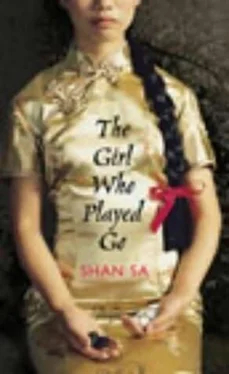[3] This morning’s newspaper tells us that Major Zhang Xueliang has taken Chiang Kai-shek hostage in the town of Xian, [3] where he and his exiled army have sought refuge for six years. In exchange for the generalissimo’s freedom, Zhang Xueliang has demanded that the Kuomintang be reconciled with the Communist Party to reconquer Manchuria. “Zhang Xueliang is unworthy of his good name and he’s an inveterate womanizer,” Captain Mori says dismissively. “The very day after September 18, 1931, [4] when our army had surrounded the town of Shen Yang where he had his headquarters, the degenerate weakling fled without even attempting to resist us. As for Chiang Kai-shek, he’s a professional liar. He’ll welcome the Communists with open arms, the better to throttle them.” “No Chinese army can take us on,” threw in one of the officers while his back was energetically scrubbed by his orderly. “The civil war has ruined China. One day, we’ll annex the entire territory, another Korea. [5] You’ll see, our army will follow the railway that runs from northern China to the south. In three days we’ll take Peking, and six days later we’ll be marching through the streets of Nanking; eight days after that we’ll be sleeping in Hong Kong, and that will open up the doors to Southeast Asia.” Their comments confirm various rumors, already rife in Japan, in the heart of our infantry. Despite our government’s reticence, the conquest of China becomes more inevitable every day. That evening I go to sleep relaxed, and happy to be clean. I am roused by a rustling of clothes: I am sleeping in my own room, and Father is sitting in the next room, wrapped in his dark-blue cotton yukata. Mother is walking up and down, the bottom of her lavender-gray kimono opening and closing over a pale-pink under-kimono. She has the face of a young woman; there is not a single wrinkle round her almond-shaped eyes. A smell of springtime wafts around her-it’s the perfume Father had sent from Paris! I suddenly remember that she has not touched that bottle of perfume since Father died.
On December 12, 1936, Zhang Xueliang took Chiang Kai-shek hostage. He freed him on December 25 and accompanied him back to Nanking, where the Kuomintang-the popular democratic party in China -was based. As they stepped off the airplane, Chiang broke their agreement and imprisoned Zhang for some fifty years.
[4] “Zhang Xueliang is unworthy of his good name and he’s an inveterate womanizer,” Captain Mori says dismissively. “The very day after September 18, 1931, [4] when our army had surrounded the town of Shen Yang where he had his headquarters, the degenerate weakling fled without even attempting to resist us. As for Chiang Kai-shek, he’s a professional liar. He’ll welcome the Communists with open arms, the better to throttle them.” “No Chinese army can take us on,” threw in one of the officers while his back was energetically scrubbed by his orderly. “The civil war has ruined China. One day, we’ll annex the entire territory, another Korea. [5] You’ll see, our army will follow the railway that runs from northern China to the south. In three days we’ll take Peking, and six days later we’ll be marching through the streets of Nanking; eight days after that we’ll be sleeping in Hong Kong, and that will open up the doors to Southeast Asia.” Their comments confirm various rumors, already rife in Japan, in the heart of our infantry. Despite our government’s reticence, the conquest of China becomes more inevitable every day. That evening I go to sleep relaxed, and happy to be clean. I am roused by a rustling of clothes: I am sleeping in my own room, and Father is sitting in the next room, wrapped in his dark-blue cotton yukata. Mother is walking up and down, the bottom of her lavender-gray kimono opening and closing over a pale-pink under-kimono. She has the face of a young woman; there is not a single wrinkle round her almond-shaped eyes. A smell of springtime wafts around her-it’s the perfume Father had sent from Paris! I suddenly remember that she has not touched that bottle of perfume since Father died.
On September 18, 1931, the Japanese army defeated Zhang Xueliang’s troops and took over Manchuria.
[5] “No Chinese army can take us on,” threw in one of the officers while his back was energetically scrubbed by his orderly. “The civil war has ruined China. One day, we’ll annex the entire territory, another Korea. [5] You’ll see, our army will follow the railway that runs from northern China to the south. In three days we’ll take Peking, and six days later we’ll be marching through the streets of Nanking; eight days after that we’ll be sleeping in Hong Kong, and that will open up the doors to Southeast Asia.” Their comments confirm various rumors, already rife in Japan, in the heart of our infantry. Despite our government’s reticence, the conquest of China becomes more inevitable every day. That evening I go to sleep relaxed, and happy to be clean. I am roused by a rustling of clothes: I am sleeping in my own room, and Father is sitting in the next room, wrapped in his dark-blue cotton yukata. Mother is walking up and down, the bottom of her lavender-gray kimono opening and closing over a pale-pink under-kimono. She has the face of a young woman; there is not a single wrinkle round her almond-shaped eyes. A smell of springtime wafts around her-it’s the perfume Father had sent from Paris! I suddenly remember that she has not touched that bottle of perfume since Father died.
From 1905 to 1910 Japan succeeded in driving Russian and Chinese forces out of Korea, then it colonized the peninsula, enforcing the use of the Japanese language and instigating a policy of cultural assimilation.
[6] Ten days later I receive a letter from Lu. He tells me he has obtained a passport for the inner territories, [6] and that by the time I read his letter he will have left for Peking. I feel strangely sad as I decipher his words. I go to the Square of a Thousand Winds, where the players, unperturbed, abandon themselves to their accustomed passion. As a little girl I used to follow my cousin wherever he played. Once he was so much consumed by a fever that he passed out on the go-board, and I won the tournament for him, a victory by which I became the only woman to be admitted into the exclusive society of true enthusiasts. Years have passed and now I am anxiously watching the twilight of my childhood, quietly sinking, never to rise again. Lu doesn’t understand. He wants me to join him in the adult world, but he doesn’t realize that I think it is a sad place full of vanity, and it frightens me.
As Manchuria is often called “the country outside the Great Wall,” the areas inside the Great Wall are also known as the “inner territories.” In 1932, when Manchuria became independent, the Japanese instituted a system of passports so that they had more control over movements between the zone that was under their influence and the rest of China.
[7] I have never known a place where the wealthy are so conscious of their riches while the poor struggle so desperately. The lack of purpose in this population confirms my opinion: the Chinese Empire has sunk irretrievably into chaos. This ancient civilization has imploded under the reign of the Manchurians, who refused openness, science and modernization. Today, as the chosen prey of the Western powers, it survives by relinquishing land and autonomy. Only the Japanese, who have inherited a pure, unhybridized version of Chinese culture, [7] have made it their vocation to liberate the Empire from the European yoke. We will give her people back their peace and dignity. We are their saviors.
From the sixth century Buddhism and Chinese culture infiltrated the Yamato Imperial court of Japan. In 604 Prince Shotoku sent an official embassy to the court of Chang’an (now Xian) in China. In 645 the Yamato court decided to turn Japan into a copy of Tang China, and Japanese calligraphy adopted Chinese ideograms. The political problems within the Tang court, and the Tatar invasion, persuaded the Japanese to withdraw their embassy in 838. From then on Japanese culture has evolved independently from that on the Chinese mainland.
Читать дальше












